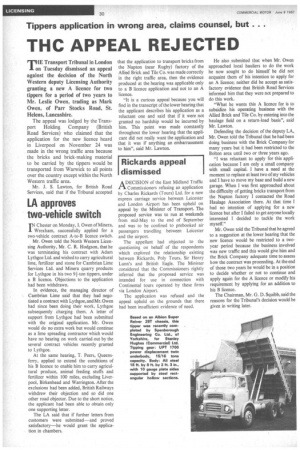Rickards appeal 1 dismissed
Page 32

If you've noticed an error in this article please click here to report it so we can fix it.
A DECISION of the East Midland Traffic PI Commissioners refusing an application by Charles Rickards (Tours) Ltd. for a new express carriage service between Leicester and London Airport has been upheld on appeal by the Minister of Transport. The proposed service was to run at weekends from mid-May to the end of September and was to be confined to prebooked air passengers travelling between Leicester and the airport.
The appellant had objected to the questioning on behalf of the respondents which explored the relationship existing between Rickards, Poly Tours, Sir Henry Lunn's and British Eagle. The Minister considered that the Commissioners rightly inferred that the proposed service was intended for use in connection with Continental tours operated by these firms via London Airport.
The application was refused and the appeal upheld on the grounds that there had been insufficient evidence of need. He also submitted that when Mr. Owen approached local hauliers to do the work he now sought to do himself he did not acquaint them of his intention to apply for an A licence; neither did he accept as satisfactory evidence that British Road Services informed him that they were not prepared to do this work.
"What he wants this A licence for is to subsidize his operating business with the Allied Brick and Tile Co. by entering into the haulage field on a return-load basis", said Mr. Lawton.
Defending the decision of the deputy LA, Mr. Owen told the Tribunal that he had been doing business with the Brick Company for many years but it had been restricted to the Bolton area until two or three years ago.
"I was reluctant to apply for this application because I am only a small company with small capital. I have a need at the moment to replace at least two of my vehicles and I have to move my base and build a new garage. When I was first approached about the difficulty of getting bricks transport from the Napton factory I contacted the Road Haulage Association there. At that time I had no intention of applying for a new licence but after I failed to get anyone locally interested I decided to tackle the work myself."
Mr. Owen told the Tribunal that he agreed to a suggestion at the lower hearing that the new licence would be restricted to a twoyear period because the business involved was new traffic and this would give him and the Brick Company adequate time to assess how the contract was proceeding. At the end of those two years he would be in a position to decide whether or not to continue and apply again for the A licence or modify his requirement by applying for an addition to his B licence.
The Chairman, Mr. G. D. Squibb, said the reasons for the Tribunal's decision would be given in writing later.




























































































































